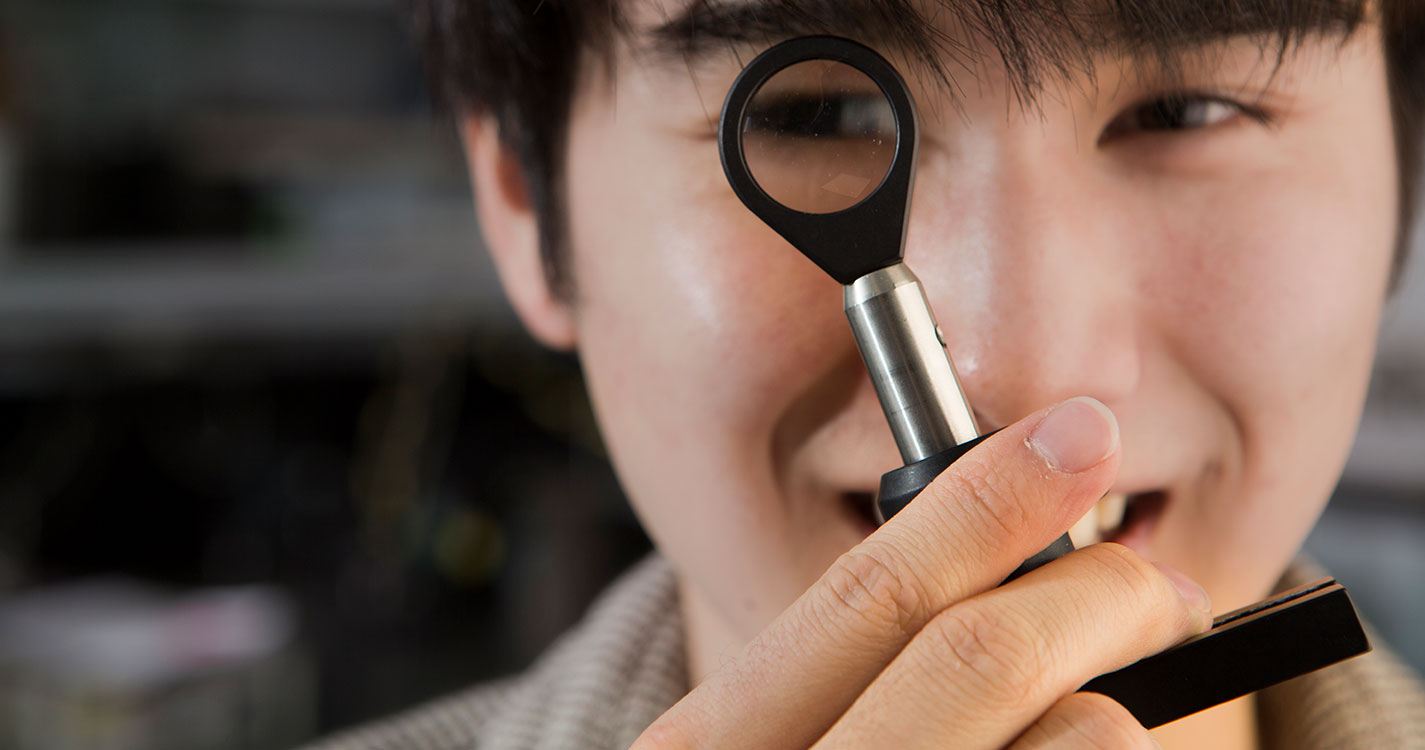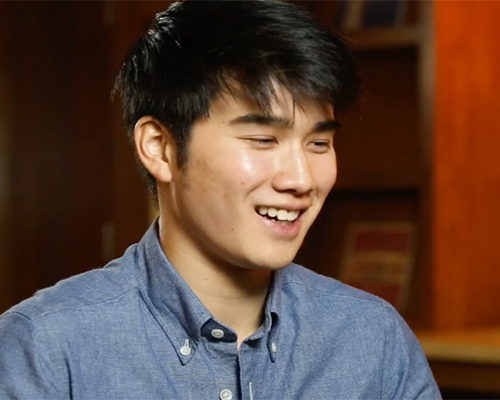Last summer, Donald Swen ’18 controlled a robot without lifting a finger — but he had to travel to Japan to do it.
In a video filmed at Sekitani Laboratory, a research lab at Osaka University, Swen stands by a table holding the robot, a 2-foot tall blue and gray Buzz Lightyear-like figure.
Swen wears a small circuit board attached to a plastic strap around his forehead. He announces, “I will now start blinking my eyes.”
The robot’s eyes also open and close, and it responds, “I received his eye blinks.”
When Swen sits on a chair, the robot mimics his actions and hunkers down on the table.
The video illustrates a project Swen, a Willamette physics student, worked on as part of a 13-week fellowship through the Nakatani Research and International Experiences for Students (RIES) program administered by Rice University in Houston. Alongside a team of researchers at Osaka University, one of the top research institutions in Japan, Swen helped construct part of a circuit board that interprets human brain waves to direct a robot.
Although that project focused on brain waves, Swen says the technology of amplifying electrical signals has a host of other potential applications. By providing immediate, real-time data, the technology could notify caregivers of medical emergencies or enable engineers to monitor the metal of buildings, bridges, airplanes and infrastructure for signs of corrosion.
The Sekitani Laboratory researchers also want to make whole devices — not only the transistor circuits — flexible to further the Internet of Things, a concept of cloud connectivity for all kinds of electrical equipment.
Finding a path to the humanities and science
Swen’s interests are as wide-ranging as the Internet of Things.
As a student in in Willamette’s joint degree program, often referred to as the “3-2 program,” he will earn a liberal arts degree in three years and a Bachelor of Science degree in two years at one of three partner institutions: Columbia University in New York, the University of Southern California in California or Washington University in Missouri.
Other joint degree options are the five-year BA/MBA program with Willamette’s Atkinson Graduate School of Management, the six-year BA/JD program with the Willamette University College of Law and the five-year program resulting in a BA from Willamette and a master’s in forestry or environmental management from Duke University in North Carolina.
Swen appreciates the breadth of knowledge provided by a liberal arts education, along with the opportunities at Willamette to satisfy his curiosity about social issues and sustainability. But he also wants to pursue a career using the exciting possibilities of modern technology to help people.
He says, “The 3-2 program seemed like an interesting way to go through it — to first get a liberal arts degree and learn how to think, then move on to engineering school and acquire very concrete skills.”
Fellowship opens doors to new experiences
For the RIES fellowship, Swen joined 14 American science and engineering students in Japan. He chose a lab working in a field he knew nothing about: organic electronics. So, he applied the attitude he learned at Willamette — “When you’re stuck, there’s always a way forward,” he says, — and read hundreds of pages of dense, graduate-level science articles, literature and textbooks the first week he arrived at the laboratory.
Swen spent most of his time in a cleanroom constructing and testing a Saran Wrap-like plastic embroidered with transistor circuits that can amplify electrical signals. After eight weeks, his team integrated these amplifiers onto a flexible electrode created from a soft organic material that stretches like rubber but conducts electricity like metal.
Outside the lab, Swen learned Japanese, attended lectures led by esteemed researchers and explored the country’s culture.
After the fellowship, he gave a few presentations of his work in Japan and one at Rice University. There, he spoke with Nobel Prize winner Robert Curl, who is considered the father of materials science.
Driven to success
The international fellowship was the second undergraduate research trip that Swen, a junior, has completed. He spent the summer after his freshman year in Louisiana on a National Science Foundation-sponsored grant, during which he helped construct a flexible fabric that generates electricity from body heat.
Associate Professor of Mathematics Peter Otto says very few first-year students are accepted into the challenging REUs. He was also impressed — but not surprised — by Swen’s ability to land an international research experience so early in his academic career.
As a freshman — and one of the youngest students in the class — Swen took and excelled in Otto’s multivariable calculus course. Otto hopes other students will emulate Swen’s drive for achievement.
“Donald did his homework on researching programs, looked for opportunities and just went for the REU fellowship,” he says. “He recognizes he’s only here for a few years and wants to take advantage of all the great resources.”
Indeed, Swen has seized opportunities at Willamette. Beyond intellect-stretching classes, he participated in several community service learning projects and led a Take A Break trip addressing youth homelessness in Seattle.
He also built strong relationships with faculty members, such as Associate Professor of History Wendy Petersen Boring. She inspired Swen to read a stack of books while he was in Japan because he wanted to know what books changed her life. Despite his heavy workload at the lab, he emailed her summaries of each book — including “My Story As Told by Water,” by David James Duncan and “Gardeners of Eden: Rediscovering Our Importance to Nature” by Dan Dagget —and how it changed his perspective.
“What stands out so much to me is Donald’s capacity and desire to think of questions of ethics, purpose and meaning,” she says.
Next fall, Swen begins the second part of his 3-2 degree journey. He aims to attend Columbia University to pursue materials science engineering. Out on the East Coast, he’ll take the skills and knowledge he acquired at Willamette — and his desire to do good in the world.
“I have this dream of someday starting a social enterprise,” he says. “In life, we have to do things that make us happy.”



